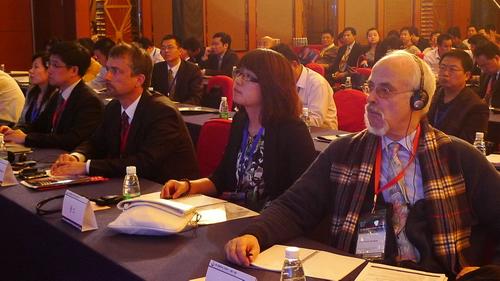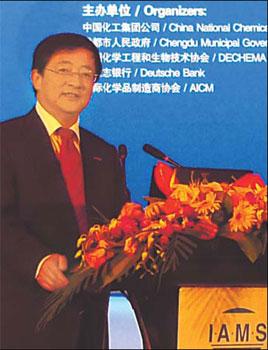The country must increase investment to develop new materials and products
CHENGDU - China has made great steps in the research of new materials in its chemical industry since it adopted reform policies in the late 1970s.
But it still has a way to go to catch up with the advanced world level, deputies told delegates at the two-day 3rd International Advanced Materials (Chengdu) Summit which ends on Friday.

Overseas participants listen attentively at the Global Advanced Materials Industry Development Conference on Thursday. The conference is part of the 3rd International Advanced Materials (Chengdu) Summit held from Thursday to Friday. [PHOTOS BY HUANG ZHILING / CHINA DAILY]
The country has progressed considerably in the research of new materials in the chemical industry thanks to investment for major laboratories and research centers by the State, said Gu Xiulian, former vice chairwoman of the Standing Committee of the National People's Congress.
According to Li Yongwu, president of China Petroleum and Chemical Industry Association, the output value of the country's new materials in the chemical industry surpassed 100 billion yuan ($15 billion) last year.
But the sector lacks core technologies and relies heavily on imports. About 44 percent of the products are from abroad, he said.
Ren Jianxin, president of China National Chemical Corporation, said that domestic enterprises involved in new materials in the chemical industry offered only a limited number of products and product varieties were limited too, which could not satisfy domestic needs.
In addition, many redundant projects in the industry have been built, which is a great waste of resources, he said.
Ren's company - ChemChina, is committed to a long-term strategy of developing new materials and specialty chemical products.

Ren Jianxin, chairman of the China National Chemical Corp, delivers a speech at the ongoing 3rd International Advanced Materials (Chengdu) Summit.
As part of this policy, ChemChina has already consolidated its business into six units - advanced chemical materials and specialty chemicals, basic chemical materials, oil processing and refining products, agrochemicals, rubber products and chemical equipment.
The 3rd International Advanced Materials (Chengdu) Summit is aimed at gathering industrial elites to inspire sparks of opportunity and innovation within the advanced materials industry.
It draws over 300 government officials involved in drafting policy for or management of the advanced materials industry, directors and leaders of industrial associations, societies and organizations, CEOs, presidents, vice-presidents, general managers, directors, managers, academicians, experts, R&D directors, researchers, bankers, financers, and securities and private placement investors from different parts of the world.
The current forum consists of the Global Advanced Materials Industry Development Conference, Energy Advanced Materials Industry Conference, Biological Advanced Materials Development Conference, Frontier Advanced Materials Technology Development Conference and Advanced Materials Industry Innovation and R&D Conference.
The financial turmoil severely damaged the global economy in 2008 and has impacted on the chemical industry, which is now facing an unprecedented challenge.
Deputies at the current forum talked about what the global economy would change in 2010, how to boost advanced materials industry growth in the post financial crisis era, how to grasp opportunities when faced with the sustainable economical strategies and modes such as new energy, low-carbon, energy-saving and emission-reduction, recycling and industrial adjustment, and what impact China's 12th Five-Year Plan (2011-15) will have on the sector.
Shao Ning, vice minister of the State-owned Assets Supervision and Administration Commission of the State Council, said that to cope with the international financial crisis, nations of the world are competing to invest in the new materials sector.
The United States has proposed to let its investment in the sector account for 3 percent of its gross domestic product. The European Union plans to invest 105 billion euros in the development of the green economy before 2013.
China, which also pays great attention to the development of new materials, has to invest more in the sector and train more talented personnel, as the country badly needs leaders in the industry, he said.





